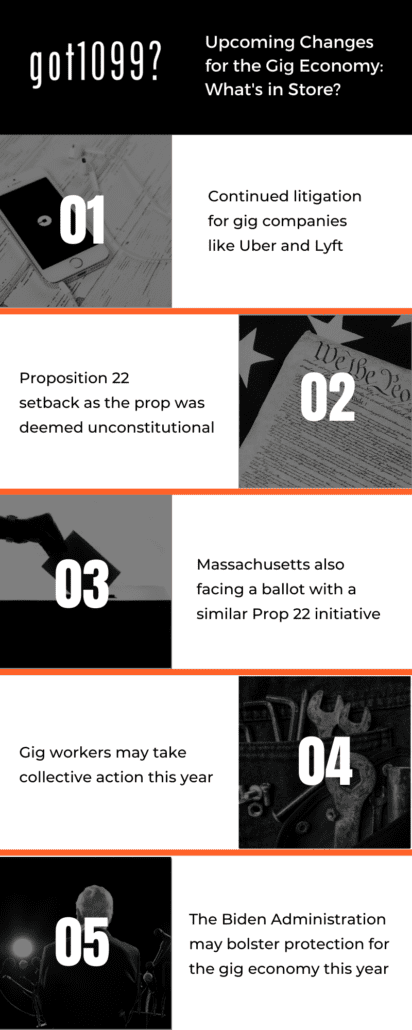What is a 1099 Independent Contractor?
A 1099 independent contractor is someone who works for an employer on a contractual basis. They also:
- Are self-employed
- Set their own work hours
- Uss their own tools
- Do not receive employee benefits
- Are not on payroll
- Do not have taxes withheld
- Can work for multiple employers
The Internal Revenue Service (IRS) says it best, “The general rule is that an individual is an independent contractor if the payer has the right to control or direct only the result of the work and not what will be done and how it will be done.”
When is someone not classified as an independent contractor? “You are not an independent contractor if you perform services that can be controlled by an employer (what will be done and how it will be done).”
In order to find the right of control, answer the following questions:
- Behavioral Control: Are you in charge of the manner in which workers perform their duty?
- Financial Control: Do you pay regular wages and have the ability to fire the employee?
- Relationship to business: Is the employee an essential part of helping your business run?
Employers who do control the behavior, finances and relationship to the business are working with W-2 employees.
What is AB-5?
Assembly Bill 5 (AB-5) went into effect on January 1, 2020. This new piece of legislation gives employers additional guidelines to classify W-2 employees and 1099 independent contractors.
In order for an independent contractor to be classified as such, they must pass AB-5’s ABC test. A person is automatically classified as a W-2 employee unless they meet all three of the following criteria:
- The worker is free from the control and direction of the hiring entity in connection with the performance of the work, both under the contract for the performance of the work and in fact;
- The worker performs work that is outside the usual course of the hiring entity’s business; and
- The worker is customarily engaged in an independently established trade, occupation, or business of the same nature as that involved in the work performed.
Learn more about the difference between the AB-5 test and the Borello here.
Do 1099 Independent Contractors Collect Unemployment?
In short, 1099 independent contractors cannot collect unemployment. They do not qualify because of their self-employment status – meaning their employment status technically never changed because they were never employed by someone.
The only exception to this rule was the Coronavirus Aid, Relief, and Economic Security (CARES) Act in 2020 that ended September 2021. The act temporarily granted unemployment benefits to independent contractors.
Now, independent contractors are again ineligible to receive unemployment.
If you as an employer hire an independent contractor who believes they can file for unemployment, there was a miscommunication during the hiring process that should be rectified immediately. 1099s who file for unemployment open your business up to an EDD misclassification audit.
Why Does a 1099 Filing for Unemployment Trigger an EDD Audit?
EDD takes misclassifications seriously. Why? They want to protect employees who are classified as 1099 independent contractors instead of W-2 employees. Employees receive work benefits and have payroll tax deductions the employer must match. 1099s on the other hand, do not receive those same benefits nor do they have taxes deducted from their paycheck.
Employers who misclassify their workforce, intentionally or unintentionally, strip workers of their entitled employee benefits. While also not paying payroll taxes that the government would receive from W-2 employees.
For example, a company named Dynamex, reclassified their W-2 employees as 1099 independent contractors to avoid paying employee benefits. When the case was brought to light, the company ended up owing millions of dollars in fines and penalties for their misclassification.
What are the top EDD Audit Triggers?
- Independent contractor filing for unemployment
- Employee complaints
- Late Filing of Taxes
- Randomized verification audit
Going through an audit for your business can be a 3-9 month process of auditors reviewing your business’ records from the past 3-8 years, depending on your case. This can be a costly undertaking for a business owner and it’s important to consult an expert when you do experience an audit to make the process as seamless as possible.
Avoid an EDD misclassification audit before it happens by correctly classifying your independent contractors when they are hired. Clearly communicate the status of their employment to avoid any miscommunications. For more information on how a got1099 report helps business owners in the face of an audit, read our article here.

LOCATION
La Jolla, CA 92037
o: (888) got-1099 (468-1099)
e: contact@got1099.com
copyright got1099®
copyright got1099?®
copyright Start1099®
GET AB-5 And CASLB Updates in your inbox
IMPORTANT INFO
Disclaimer
got1099 is a business reporting company providing business analysis reports to companies re: their 1099 independent contractors We do not provide legal advice. Consult with your attorney relating to any legal issues.


